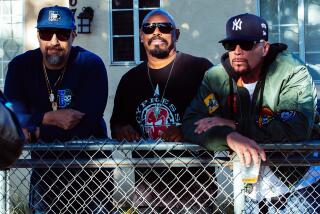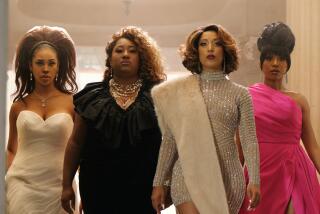Producer Makes Networks Offer They Can’t Refuse : Television: ‘Scared Silent,’ Arnold Shapiro’s documentary on child abuse, will be simulcast Friday by CBS, NBC and PBS.
- Share via
The TV listings will look a little different Friday night. One program, “Scared Silent,” will be broadcast simultaneously on CBS, NBC and PBS at 10 p.m. in an act of rare network cooperation to call attention to child abuse.
Hosted by Oprah Winfrey, a survivor of child abuse, the one-hour documentary will be shown again on Sunday night by a fourth network, ABC.
The very notion of getting three competing, national broadcast TV networks to simulcast a non-news event in prime time is remarkable in itself.
But behind “Scared Silent” is a producer, Arnold Shapiro, who first displayed his ability to turn controversial material into a TV event with a historic 1978 documentary, “Scared Straight!,” in which convicts used uncompromising, four-letter language in an attempt to frighten trouble-prone youngsters from choosing a life of crime.
“Scared Straight!,” hosted by Peter Falk, won an Emmy and an Oscar and was recognized as an immediate, break-through TV classic after its initial showing on KTLA Channel 5, which led to wide syndication. And Shapiro hopes that “Scared Silent” will have a similar, potent impact of its own.
The program, which looks at sexual, physical and emotional child abuse through a group of harrowing cases, was given free to the networks, says Shapiro, who explains that it was funded by the USAA insurance company, his longtime backer on documentary projects.
“My strategy,” he said in his modest office at KTLA in Hollywood, “was to offer the networks something they couldn’t refuse. And the way to do that was to offer them a program free of charge that they could put commercials in if they chose to.
“And I could pick a night that wouldn’t be a threat to them because you know how competitive they are, and the night we picked was the Friday night of Labor Day weekend.”
As for Winfrey, Shapiro says: “There was never any doubt who was going to host this, in our minds, because she’s a survivor, because she is strongly committed to fighting child abuse and because she’s very credible. I think within two weeks she made the commitment to do it.”
Says Winfrey: “It was very important for me to host this special because I know what it is to be a silent victim of child abuse. I blamed myself for most of my adult life. You lose your childhood once you’ve been abused.”
“The worst crime,” adds Shapiro, is the children “and even adult survivors who remain scared silent, who remain fearful and silent.”
An 800 telephone number for viewers will be shown three times during the special. “We fought for that,” says the producer. “You can’t ask people to wait for the end of a program.”
Although Shapiro had the support of various child-abuse authorities, his two principal challenges, he says, were how to make a program about the subject strong yet palatable--and how to persuade the networks to go along with a simulcast.
“I really had to think about how to do (the show),” he says. “The idea repulses a lot of people. You hear talk about a documentary on child abuse and you turn to any other channel. And that’s probably what helped my thinking--that if people are going to turn to other channels, maybe the other channels should be having the same thing on.”
The approach he decided on, he says, was “solution-oriented. It wasn’t going to be like a typical network news documentary which presented you with an overview of the problem and then said good night and left you feeling depressed.
“Our approach was going to be that there was a horrible problem and that however bad you think it is, it’s that bad or worse. But we were going to show people how to work toward solutions. And it was not going to be a program that visually you couldn’t watch. It would not show battered children. There are no torture devices. There are no photographs of ugly scenes. The power is in the people’s stories.”
While making “Scared Silent,” Shapiro was also trying to pull off the simulcast, hoping to sell the networks on the idea “that this topic was worthy of an event presentation.” He asked a top TV executive whether to pitch all three networks together or one at a time. The executive said one at a time.
“I decided I would start with CBS because CBS is my network. That’s where I do ‘Rescue 911,’ ” says Shapiro. So he met with Jeff Sagansky, president of CBS Entertainment, and his No. 2 man, Peter Tortorici.
“I was more nervous than they realized,” says the producer, “because if I failed at CBS, I was destined to fail everywhere because people would say, ‘If your own network doesn’t want to do it, why should we?’ ”
He told Sagansky and Tortorici, “This is the program and I’m offering it to you free of charge if you will agree to air it simultaneously with the other networks, whom I’ve not gone to yet.” Adds Shapiro: “Fortunately, Jeff Sagansky knew much more about child abuse than I had realized. He said, ‘We’re in.’ It was about a six-minute meeting.”
NBC was next. Shapiro contacted a top NBC executive, John Agoglia, who had advised him on the marketing of the program. Agoglia, says Shapiro, simply told him: “I’ll handle NBC. Consider that you have NBC.”
“So I had CBS and NBC,” says Shapiro. His next stop was PBS, and he flew to Washington for talks with the public-television network.
“PBS’ question,” says the producer, “was: We don’t have commercial breaks. How is it going to remain a simulcast? Ultimately, it was decided by them that they would just air it. It would start at 10 o’clock and theirs would end six minutes earlier than the other networks.
“So then we had three networks. Then we began the ABC process. That began a long and frustrating attempt to get ABC to join the simulcast. It lasted roughly from February to July, and I was unsuccessful. I don’t have bad things to say about ABC. I’m just perplexed that I was not able to get them aboard.”
At one point, Shapiro says--after the 10 p.m. Friday slot had been agreed upon by CBS, NBC and PBS--he was called by an ABC executive in New York who told him that his network would not preempt its bedrock weekly news series, “20/20,” which airs at that time.
However, Winfrey, who has close ties with ABC, reportedly used her clout at the network on behalf of the special. Although her daily program is syndicated by King World, she produces the “ABC Afterschool Specials,” has a development deal with ABC for series and other programs, and her talk show is carried by the network’s owned stations.
In the end, says Shapiro, ABC still refused to preempt or move “20/20” but agreed to present “Scared Silent” two days later, also in the 10 p.m. slot.
Nowadays, says the producer, he’s looking at ABC’s later airing of the program as a possible blessing because people who may miss Friday’s simulcast, but hear about it, will have a chance to see it again on Sunday.
But, adds Shapiro, ABC is the only one of the networks that refuses to broadcast the “three words of profanity” on the program.
Nonetheless, Shapiro’s coup is undeniable. “Scared Silent,” in addition to blanketing American television this weekend, will also be shown in Canada and on other English-language outlets around the world. And his marketing of the program was relentless. For example:
“We’re also indemnifying all the networks too. Our insurance is indemnifying ABC, NBC, CBS, PBS for lawsuits. Anybody can sue anybody for any reason, however outrageous it is. One of the offerings to the networks was that we would name them as additional insured on our producers’ liability, errors and omissions insurance policy.”
And what about viewers who may question the inclusion of some of the show’s extraordinarily personal revelations?
“We didn’t go after people. People came to us,” says Shapiro. “We were in contact with a lot of organizations that do therapeutic work. And they put out the word. The people you see are all individuals who wanted to do this to prevent it from happening to others. It was all done with their therapists’ consent, permission, support, presence.
“Child abuse is a vicious, ugly, horrible national tragedy. And not to show a child because he or she is a child, I think is to not have people fully, viscerally appreciate what it is. We had more stories than we knew what to do with. Our phones were ringing off the hook.”
More to Read
The complete guide to home viewing
Get Screen Gab for everything about the TV shows and streaming movies everyone’s talking about.
You may occasionally receive promotional content from the Los Angeles Times.






